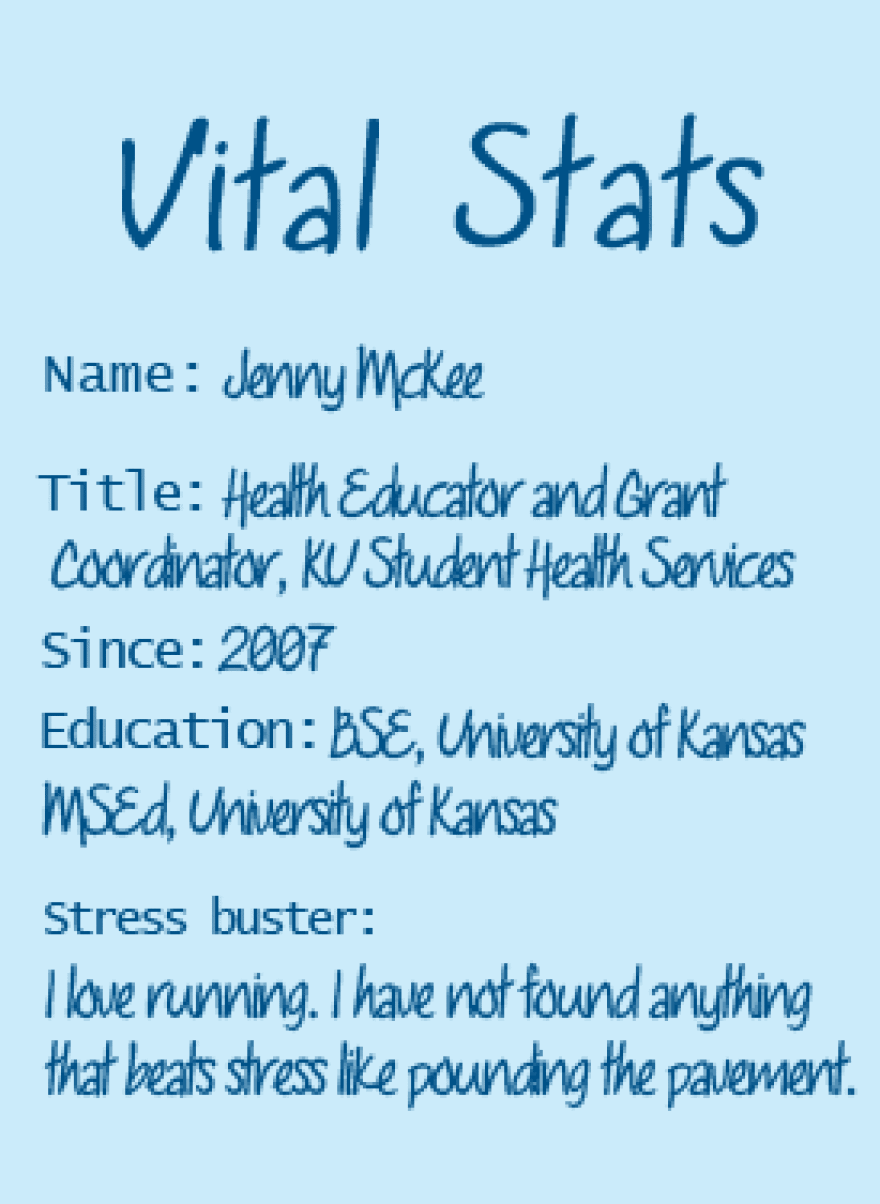The University of Kansas fall semester started this week, and along with new classes comes a big change in lifestyle for thousands of students. Junk food, all-night study sessions, marathon parties – the college life has a reputation as being a less-than-healthy one.
For this month’s KC Checkup, KCUR’s Alex Smith spoke with KU health educator and grant coordinator Jenny McKee about the health of the latest generation of young scholars.
You hear a lot of talk about the “freshman fifteen,” when students gain weight after starting college. Is that something you really see happen, or is that a myth?
They really do experience weight gain, especially in that first year of college, and it happens for several reasons.
The first of them being that students are feeding themselves for the first time maybe ever in their life, and they don’t understand very simple concepts such as portion size or what their nutrition needs are. They might have had a very healthy and somewhat restricted diet when they were growing up, getting lots of fruits and vegetables, maybe a limited amount of sugary items. But when you live in a residence hall, and you could potentially eat Fruit Loops and soft-serve for every meal, some students do choose to do those things.
Other contributing factors are alcohol and then finally stress. People that are under a lot of stress have an increased release of the hormone cortisol, and cortisol is notorious for adding to belly fat.
You mentioned alcohol, and college is also known as a time when students experiment a lot with drinking and drugs. How significant are those problems with students?
Alcohol is probably one of the biggest health issues for college campuses. According to our 2013 National College Health Assessment data, we know that just under 75 percent of our students report using alcohol at least one time in the last 30 days, and some of them use it in pretty excessive capacities.
Alcohol - when it’s in your blood stream, and you go to sleep with alcohol in your bloodstream – it doesn’t allow your body to do some of the most important functions that it needs to in order for you to succeed academically, like storing memories and retaining knowledge. Those are two very important things that a student needs to be able to do while they’re in college, and if you study all day and then you, you know, spend four or so hours drinking that night, chances are that you will go to sleep with a large quantity of alcohol in your bloodstream, meaning that you’re not going to be able to retain the knowledge that you spent all day studying.
And what about illicit or street drugs? What kind of use are you seeing of those right now?
The most commonly used illicit drug on our campus is – and this is nationally as well – is marijuana. This has been increasing over the past several years, and now that there are two states that have legalized recreational use of marijuana, I think this is something we’ll continue to see. About 22 percent of our student report using marijuana.
As far as other drugs, we see prescription drug use on the rise, especially stimulants.
So another area of student experimentation is sex, and I’m wondering: Are students these days practicing safe sex?
We’re trying to get our students to practice safer sex. About 53 percent of our students report having vaginal sex. Almost 50 percent report participating in oral sex, and then under 5 percent report participating in anal sex. So there are different safety measures that you want to take for each one of those different kinds of sex acts. So, we know that two-thirds of our students report using contraceptives the last time they had vaginal sex, which is fantastic.

Are there health issues that you see today that weren’t really present or as significant when earlier generations were in school?
I feel like stress, although it’s probably always been around, is even more common now than it used to be. Stress is the number one academic impediment that our students report. People have a lot more options in what they want to major in, and all the different organizations they can be a part of. And that’s great, but there might be too many options that leave students’ heads spinning.
The bar is set a lot higher now as well than it used to be. Having a bachelor’s degree doesn’t mean what it used to generations ago. People feel like they have to have a master’s degree to be a competitive potential candidate for a job these days because our job market is not as great as it used to be.
I think students also feel as though, financially, it takes a toll on their family for them to be on a college campus, so students feel higher stress obtaining better grades. I think students — some of them have some unrealistic expectations of what can happen in college. They want to be fantastic and perfect at everything that they do. So stress, I feel like, is a big one.






